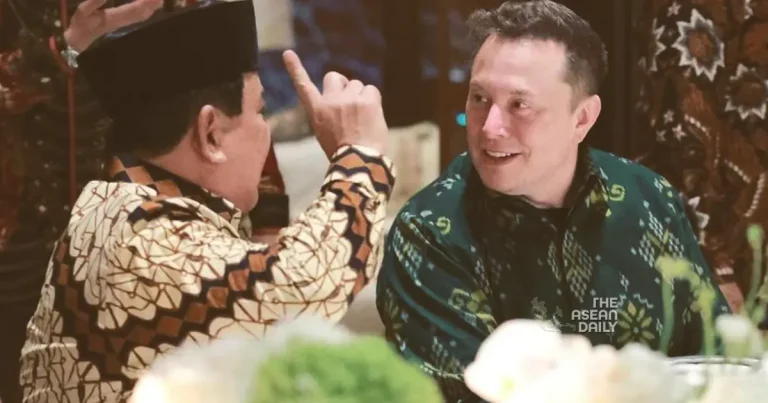22-5-2024 (JAKARTA) Billionaire Elon Musk’s recent visit to Indonesia to launch Starlink’s satellite internet services has sparked enthusiasm among top politicians, who are eager to woo the Tesla and SpaceX CEO into establishing an electric vehicle battery plant and a rocket launch pad in Southeast Asia’s largest economy.
On Sunday, Musk touched down on the resort island of Bali to unveil Starlink, a technology expected to transform healthcare services in Indonesia’s remote areas. The world’s second-richest man was greeted at the airport by Indonesian Coordinating Minister of Investment Luhut Pandjaitan, who seized the opportunity to encourage Musk to invest further in the country through Tesla or SpaceX during their car ride from the airport.
“I also offered him a launch pad for SpaceX’s rockets in [the island of] Biak. I told him that Biak was very suitable because it was on the equator, so launching costs could be cheaper,” Luhut recounted to reporters on Sunday.
On Monday, Musk met with outgoing Indonesian President Joko Widodo on the sidelines of the World Water Forum, as well as with President-elect Prabowo Subianto. Widodo has long sought to attract Musk to invest in Indonesia.
“We made an offer, is it possible to build an EV battery plant here, precursor cathode? And he [Musk] will consider it,” Luhut revealed to reporters on Monday, adding that Widodo had also asked Musk to consider establishing a rocket launch pad in Biak or a centre for artificial intelligence.
While Musk stated on Sunday that “it’s very likely” his companies would make more investments in Indonesia, he refrained from elaborating, indicating that his focus was to expand Starlink in the country for now.
“We are focusing this event on Starlink and the benefits that connectivity brings to remote islands,” he said. “I think it’s really to emphasise the importance of internet connectivity, how much of that can be a lifesaver.”
Musk’s visit to Indonesia came nearly a month after his surprise trip to China, where he had postponed a visit to India, citing his “very heavy Tesla obligations.”
Musk’s itinerary is typically scrutinized by the international business community for signs of his overseas expansion plans amid Tesla’s intense rivalry with Chinese electric vehicle makers.
In Southeast Asia, Indonesia is competing with Malaysia for Tesla’s investment. Tesla opened its first office in the region in Malaysia last July, and Malaysian Prime Minister Anwar Ibrahim stated a month later that talks were underway for Tesla to explore building a battery manufacturing plant in the country.
Putra Adhiguna, managing director at the Asia-focused energy finance think tank Energy Shift Institute, said that Musk’s visit to Bali signaled Tesla’s plans to expand its market presence across Southeast Asia.
“If we talk about the EV market, one of the growth markets after Europe and the United States is Southeast Asia. If Tesla is serious, maybe Indonesia will be the stepping stone [into the Southeast Asian market],” Putra remarked.
“The expansion of Chinese EVs is very rapid. In the Indonesian market, they recently slashed the prices of their vehicles. So if you were Tesla, you’d be worried that the Chinese expansion is running too fast. They need to be quicker to enter the market.”
Indonesian officials have repeatedly claimed in recent years that Tesla was keen to make significant investments in the country, though the company has not confirmed any such intentions.
If Tesla were to establish an electric vehicle battery plant in Indonesia, Putra suggested it would likely be due to recent measures by the US to curb the expansion of Chinese carmakers, such as a 100% tariff on Chinese-made electric vehicles and tax rebates to entice American consumers to buy electric vehicles built in the US or with batteries containing minimal metal parts supplied by “foreign entities of concern,” such as Russia or China.
“Whether an EV company used batteries with nickel or without nickel, both sectors are still controlled by China, so they don’t have an easy way out,” Putra said, noting that electric vehicle batteries made with Indonesian components could be ineligible for the rebates, as the refining of nickel – a key component of these batteries – in the country is dominated by Chinese companies.
A bigger issue, according to Putra, is whether Tesla intends to build new plants for low-cost electric vehicles given the stiff competition from Chinese carmakers. Even if such a plan were to materialize, Tesla could face fierce competition from Hyundai, China’s Wuling – the biggest sellers of electric cars in Indonesia last year – and from Vietnamese carmaker VinFast and rival BYD of China, both of which have announced plans to build manufacturing facilities in the country.
“The next question that Musk has to ponder before investing in Indonesia is whether Tesla is serious about tapping the EV market in Southeast Asia. At the moment, it’s still not clear, and Tesla’s cars are still relatively expensive here,” Putra concluded.




